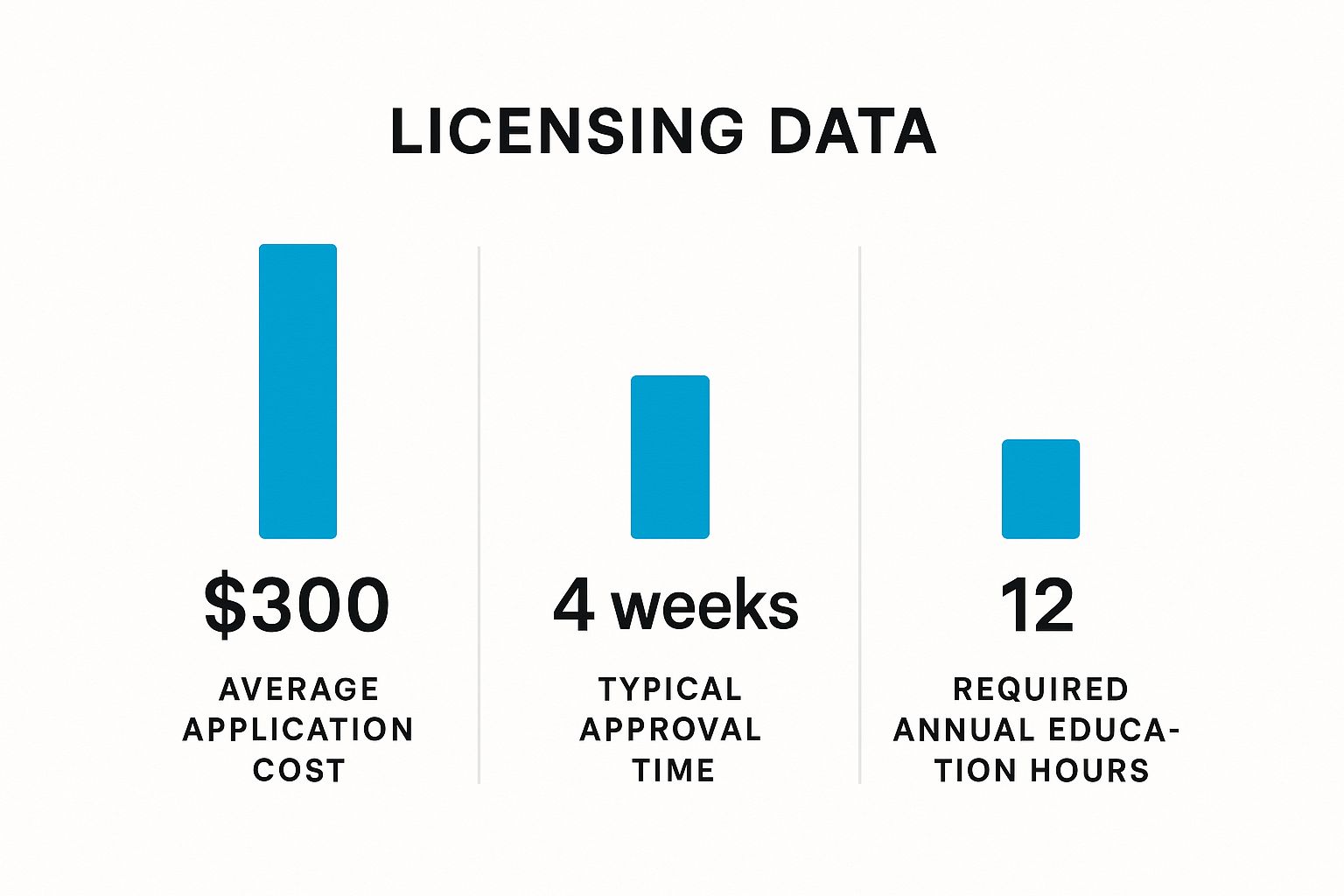Why Property Management Is The Opportunity You Can't Ignore

Let's face it, property management isn't the most glamorous industry. But it is packed with potential, especially if you're thinking about starting your own property management business. More and more people are renting these days, landlords are often juggling multiple properties, and managing tenants is becoming increasingly complex. It's a golden opportunity for anyone ready to step up and offer some much-needed support. I've spoken with countless property managers who started small and are now absolutely killing it. Their success stories consistently highlight one key factor: growing demand.
This isn't just anecdotal; the market is booming. The number of rental properties out there is staggering. In many cities, renting is the norm, not the exception. This means a constant flow of potential clients – landlords who are often feeling overwhelmed and looking for a way to offload the hassles of property management. They're tired of those late-night maintenance calls, chasing down rent, and dealing with difficult tenants. This opens up a huge opportunity for skilled property managers who can offer peace of mind and professional expertise.
Starting a property management business today means understanding where the industry is headed. The global market is expected to hit $28 billion by 2028, growing at a 7.5% annual rate. This impressive growth is fueled by urbanization and the increasing demand for rentals.
Speaking of growth, the US market alone is projected to jump from $81.52 billion in 2025 to $98.88 billion by 2029, with a 3.94% annual growth rate. This creates a fertile ground for new businesses, and a 8.8% annual growth rate from 2023 to 2025 further underscores the strong demand. Discover more insights about property management market growth. This consistent upward trend means the demand for your services is likely to keep rising, providing a solid base for your business.
To illustrate the regional variations in growth, let's take a look at the following table:
Property Management Market Growth by Region
Note: Market size and growth rate figures are illustrative and should be replaced with accurate data.
As you can see, different regions offer varied opportunities. Understanding these regional dynamics can help you tailor your business strategy for maximum impact.
Why Now Is The Perfect Time To Launch
Beyond the sheer market size, several factors make right now the perfect time to launch a property management business. Technology, for one, is making property management far more efficient. Tools like Showdigs automate key tasks, from scheduling showings to screening tenants, freeing you up to focus on building your business.
Plus, the increasing professionalization of the industry is attracting serious investors and entrepreneurs. While this raises the bar, it also creates an environment where professionalism and expertise are truly valued.
Finally, the changing demographics of both renters and property owners are creating exciting new niches. Think about the rise of short-term rentals, the growing demand for pet-friendly properties, or the increasing number of older adults who are choosing to rent. Each of these trends represents a potential area of specialization. By focusing on a specific niche, you can stand out from the competition and cultivate a loyal client base. The bottom line? The property management industry is overflowing with potential. If you're looking for a business with long-term growth prospects, this might just be the one.
Getting Your Business Foundation Right From Day One

This infographic gives you a quick snapshot of average application costs, typical approval times, and required annual education hours for property management licensing. These details might seem minor, but trust me, they can significantly impact your startup timeline and budget. Notice how the time and money investment for licensing varies quite a bit? It's a key factor to consider in your initial planning, as it directly affects when you can legally open for business.
Choosing the Right Business Structure
Let's talk about setting up your business. This is more than just filling out forms; it's about making crucial decisions that will protect you and set you up for future growth. One of the biggest decisions? Your business structure. I've seen how the wrong choice can cause major issues down the line.
I had a friend, Sarah, who started her property management company as a sole proprietorship. It seemed simple enough at the time, but when a tenant sued, her personal assets were on the line. It was a painful (and expensive) lesson learned.
Learn from Sarah's experience. Think long-term and consider these options:
- Limited Liability Company (LLC): This is a popular structure for property managers because of the personal liability protection it provides. This means your personal assets are shielded if your business faces legal action. LLCs also offer flexibility with how you’re taxed.
- S-Corporation (S-Corp) or C-Corporation (C-Corp): These offer even stronger liability protection than LLCs, but the setup and maintenance are more complex. The tax implications are also different. If you're aiming for significant growth, this structure might be worth the extra effort.
- Partnership: If you're starting with a business partner, a partnership formally defines roles and responsibilities. However, keep in mind that a general partnership, similar to a sole proprietorship, generally doesn’t offer personal asset protection.
Seriously, talk to a business advisor or lawyer. It’s a worthwhile investment to get this right. They can help you navigate the specifics of each structure and figure out what's best for your unique circumstances.
Before we move on, let's look at a quick comparison of the main business structures:
Business Structure Comparison for Property Management
As you can see, each structure has its pros and cons. Choosing the right one is essential for long-term stability and success.
Insurance and Bonding: Protecting Your Business
Insurance isn’t just an expense, it’s an investment in your peace of mind. When you're starting out, you'll need general liability insurance to protect yourself from accidents or property damage. But that’s not all. Errors and omissions insurance (E&O) is also essential. It protects you if you make a mistake – things like accidentally violating fair housing laws or mishandling funds.
Bonding is another crucial aspect. A surety bond protects your clients if you mishandle their money. It shows you're a professional and can be a real advantage when winning new clients, especially in competitive markets.
Accounting Systems: Setting Yourself Up for Financial Success
From day one, setting up your accounting system correctly is absolutely vital. It might not be exciting, but trust me, it will save you from major headaches down the road. Pick software that can handle trust accounts, track income and expenses, and create reports. I’ve seen too many new property managers struggle with disorganized spreadsheets and piles of receipts. Invest in good accounting software from the get-go – you won’t regret it. Quickbooks is a popular choice.
Defining Your Service Area and Specialization
Finally, think about your niche. Are you focusing on residential or commercial properties? Or maybe a specific type of property like vacation rentals? Are you targeting a particular neighborhood or city? Narrowing your focus helps you become an expert in that area and makes your marketing more effective. When you’re first starting, specializing can really help you build a solid brand and attract the right clients. For instance, when I launched my business, I chose to specialize in managing high-end condos. This allowed me to establish a reputation for quality service and command premium prices. That strategic choice was a cornerstone of my early success.
Mastering The Legal Maze Without Losing Your Mind

This image perfectly captures the tangled web of legal stuff you have to deal with in property management. It can feel overwhelming, right? But honestly, if you break it down, it’s manageable. And remember, understanding these regulations isn't just about checking boxes—it’s about building a business that’s both reputable and built to last.
Licensing and Certifications: What You Really Need
Okay, let's talk licensing. In many places, you absolutely need a real estate broker's license to even start a property management business. It's not just a formality – it shows clients you know what you're doing. I remember when I was starting out; the whole process felt huge. Applications, exams, fees… it seemed like a mountain to climb. But trust me, getting licensed not only lets you operate legally, it gives you instant credibility with potential clients.
Now, a broker's license is often the bare minimum. Other certifications aren’t always required by law, but they can seriously boost your profile. For instance, the Certified Property Manager (CPM) designation can make you a real standout in a competitive market. Want to learn more? Explore the various certifications and licenses for property managers. These credentials show you’re serious about professional standards and can give you a leg up when you’re trying to attract clients.
Navigating Fair Housing and Tenant Rights
This is where things get real. Fair housing laws are not something you can mess with. Discrimination, even if you don’t mean to do it, can result in big fines and seriously damage your reputation. I once saw a property manager lose a major client because they weren’t current on fair housing guidelines. It was a tough lesson, but it showed me how important it is to stay informed and compliant. So, make absolutely sure you're familiar with all the fair housing rules – federal, state, and local.
Tenant rights are another critical piece of the puzzle. These can change a lot from state to state and cover everything from how leases work to the process of eviction. Early in my career, I had a situation where a tenant's rights were accidentally violated. It was a real learning experience, and it showed me just how vital it is to really understand these regulations.
Contracts and Trust Accounts: The Essentials
Solid contracts are your protection. They protect both you and your clients by clearly spelling out everyone’s roles and responsibilities. A well-written contract should cover everything – from fees and the services you provide to what happens if someone wants to end the agreement early.
Trust accounts are another fundamental legal aspect. These are special accounts where you keep client money, like rent payments and security deposits. Mishandling these funds can have serious legal repercussions. As you're building your business, think about how to protect what you've worked for. Learn more about strategies to protect your assets. Setting up and managing these accounts correctly is crucial for staying compliant and building trust.
Security Deposits and Documentation: Staying Organized and Compliant
Security deposit rules can be confusing. They tell you how much you can collect, where you have to keep the money, and when you’re allowed to keep part or all of it. I’ve seen new property managers get into hot water by not understanding these regulations.
Keeping good records is also essential. Hold onto copies of everything – leases, inspection reports, maintenance requests, and all your financial transactions. This not only covers you if there’s ever a dispute but also shows you're professional and organized. Proper documentation is really the foundation of a well-run property management business.
Technology That Actually Moves The Needle

This screenshot shows Buildium, a popular property management software. Notice how it highlights key features like online payments, maintenance tracking, and tenant communication—all essential for staying organized and efficient. The clean interface emphasizes practical functionality, reminding us to choose software that truly helps our day-to-day operations, not just something flashy. Choosing the right tech tools is crucial for a successful property management business. Forget the bells and whistles; let's focus on what makes a real difference.
Property Management Software: Your Central Hub
Imagine juggling dozens of properties, tenants, and maintenance requests with just spreadsheets and sticky notes. A total nightmare! That's why property management software is an absolute necessity. It's the backbone of your business. I've personally seen how the right platform can streamline everything from rent collection and maintenance to tenant communication and financial reports. It's a lifesaver.
When choosing software, look for features that meet your current needs and allow room to grow. Think online rent collection, automated tenant screening, and maintenance request management. Need help deciding? Check out this resource: exploring the best property management software options for 2023.
Online Rent Collection: Making Life Easier for Everyone
Speaking of rent, ditch those paper checks! Online rent payments are a total game-changer. Tenants love the convenience, and you get paid faster and more reliably. Automated reminders and payment tracking reduce late payments, too, making those awkward rent-chasing conversations a thing of the past. It's a win-win.
Mobile Accessibility: The Non-Negotiable
These days, everyone's on the go. Tenants expect to submit maintenance requests, pay rent, and contact you right from their phones. A mobile-friendly platform boosts tenant satisfaction and lets you manage your business from anywhere. I once approved a critical repair while on vacation, just using my phone. Talk about a lifesaver!
AI-Powered Tenant Screening: Saving Time and Reducing Risk
Tenant screening can be incredibly time-consuming. AI-powered tools can automate a lot of this process, analyzing applications, checking credit, and even flagging potential problems. This saves you hours and helps you choose the best tenants, minimizing risk. I've been blown away by how quickly these tools can identify potentially problematic applicants.
Emerging Tech: Virtual Tours and Smart Home Integration
Virtual tours are booming, especially for out-of-state investors or busy professionals. They let potential tenants view properties from home, saving everyone time and effort. Smart home tech can be a big draw for clients, too. Think remote access, energy monitoring, and automated maintenance – streamlining property upkeep and attracting tech-savvy tenants. The property management industry is changing fast. Over 70% of property management companies are adopting technology to boost efficiency, using software for tenant management, maintenance, and financial reporting. 65% are even using AI-driven tenant screening tools! Online rent payments have also jumped by 18%, showing how much tenants prefer digital transactions. Learn more about industry trends here. The right technology can transform your business. Focus on tools that solve real problems and improve your core services. That's how you set yourself up for success from the very beginning.
Building Your Service Menu And Pricing Strategy
So, you're ready to get down to brass tacks and figure out your services and pricing for your new property management business. This is where you build the foundation for your profitability. It's a delicate balance – you don't want to undercut everyone and work for peanuts, but you also don't want to price yourself out of the market. I've been on both sides of that fence, and neither is a place you want to be.
Core Services: The Must-Haves
Every property management business needs a core set of services. These are the essentials, the things clients absolutely expect. Think of these services as the engine of your business – they keep everything running smoothly and provide the core value clients are paying for.
- Tenant Screening: This is non-negotiable. Background checks, credit reports, and verifying rental history are key to protecting your clients' investments.
- Lease Administration: Dealing with leases, renewals, and all the related paperwork is a big chunk of the job.
- Maintenance Coordination: Being the contact for maintenance requests, scheduling repairs, and managing contractors saves property owners tons of time and hassle.
- Financial Reporting: Giving clients regular reports on income, expenses, and property performance keeps everything transparent.
These core services are what clients expect. They’re the foundation of your business and your pricing structure.
Value-Added Services: Setting Yourself Apart
Now, to really shine and justify higher rates, you need value-added services. These are the extras that show clients you’re not just managing their property, but actively making it better.
- Renovation Management: Overseeing renovations, from finding contractors to managing budgets, can be a huge selling point for busy owners. When I started offering this, my client interest really jumped.
- Investment Analysis: Providing insights on market trends, property values, and investment opportunities positions you as a strategic advisor, not just a service provider.
- Specialized Services: This could be anything from managing vacation rentals or HOA communities to handling properties with unique features like pools or historical designations. Specialization can really set you apart from the competition.
These extras are also your premium pricing differentiators. You can offer packages at different price points, catering to different client needs and budgets. They’re what make you valuable and justify higher fees.
Pricing Models: Finding the Right Fit
Picking the right pricing model is crucial for profitability. Here are a few common ones:
- Percentage-Based: Charging a percentage of the monthly rent is pretty standard. This is typically around 8-12%, but can change based on your area.
- Flat-Rate: Charging a fixed monthly fee, regardless of the rent, provides predictable income but may not be ideal for properties with rents that go up and down.
- Hybrid Approach: Combining percentage-based and flat-rate fees for different services gives you flexibility. This might involve a flat fee for basic management plus a percentage for tenant placement or other specialized services.
The best approach depends on your market, the types of properties you manage, and what your clients expect. Don't be afraid to try different things and adjust as you go.
Additional Fees: Transparency Is Key
Be upfront about any extra fees. Charging extra for tenant placement, maintenance markups, or vacancy management is common practice. However, being transparent about these fees from the get-go builds trust. Early in my career, I learned this the hard way. Being clear about all fees builds strong client relationships and prevents problems later.
Building a profitable property management business depends on a solid service menu and a smart pricing strategy. Focusing on these key elements sets you up for growth and success.
Getting Clients Without Breaking The Bank On Marketing
Having great services is only half the battle when starting a property management business. The other half? Clients! This section reveals effective, budget-friendly marketing strategies learned from managers who built their businesses from the ground up. These are the tactics they actually used to find those first crucial clients and grow organically.
Building Relationships For Referrals
Ditch the cold calling and focus on building genuine relationships. Your best allies? Real estate agents and investors. They're constantly working with property owners who could need your services. I remember landing my first major client through a realtor referral. He knew I specialized in high-end condos, so when his client needed a property manager, he sent them my way. That single referral launched my entire business.
Networking events, local meetups, even just grabbing coffee with potential partners can be game-changers. Offer value, not just a sales pitch. Share your expertise, offer helpful resources, and become the go-to expert they can rely on.
Establishing Your Online Presence
You don't need a flashy website right out of the gate, but a professional online presence is essential. A simple, well-designed website showcasing your services and contact information is key. Social media is your friend, too. Share local market insights, create educational content about property management, and engage with your community. You might find this helpful: 7 ways to lease quicker and cheaper. These simple strategies can position you as a thought leader and attract clients organically.
Leveraging Satisfied Tenants
Happy tenants are your secret marketing weapon. They're powerful advocates for your business. Encourage online reviews, offer referral bonuses, and create a community where they feel valued. Word-of-mouth marketing is still incredibly powerful, especially in property management.
Content Marketing: Establishing Your Expertise
Creating valuable content establishes you as the local expert. Consider local market reports, blog posts with property management tips, or even short videos answering common landlord questions. This builds trust and attracts clients who are actively looking for professional guidance.
Crafting Compelling Proposals
When a potential client reaches out, a well-crafted proposal can make all the difference. Highlight your experience, showcase your unique services, and clearly outline your fees. Don’t just list services, explain the value you provide. How will you simplify their lives and improve their bottom line?
Competitive Analysis: Standing Out From The Crowd
Understand your competition. What are they offering, and how can you differentiate yourself? Perhaps you specialize in a particular property type, offer a unique service, or focus on a niche market. Don’t just compete on price; highlight your value and personalized service. Remember, you’re not just managing properties; you're building relationships and offering peace of mind. These strategies, combined with genuine passion for property management, will set you apart and attract the right clients.
Scaling Smart Without Losing What Makes You Special
Once you've got a few properties under management and your business is taking off, the real challenge begins. How do you scale without becoming a faceless corporation or burning out? I've talked to a lot of property managers who’ve successfully scaled, and the key is smart, strategic growth, not just rapid expansion.
Knowing When to Hire and How to Compensate
Knowing when to bring on your first employee is a big hurdle. Don’t wait until you're drowning in work. Start thinking about hiring when you're consistently working late nights and weekends. Ideally, your first hire should handle the tasks you least enjoy or are least efficient at. This frees you up to focus on growth and client relationships.
Compensation is key to attracting and retaining good people. A competitive salary is important, but also consider performance-based bonuses or profit-sharing. These incentivize employees to invest in the company's success. When I hired my first property manager, I offered a base salary plus a bonus tied to client retention. It made a huge difference in their motivation and commitment.
Creating Systems for Consistency
As you grow, consistent service is critical. Develop clear systems and processes for everything – tenant screening, maintenance, communication, accounting – you name it. Documented procedures ensure everyone’s on the same page, maintaining quality as your team expands. I use a project management tool like Asana to track everything and keep my team organized. It’s been a game-changer. For boosting client acquisition, check out resources like Finding Investors for Real Estate for helpful strategies.
Managing Cash Flow and Expanding Strategically
Scaling requires careful cash flow management. Don’t overextend yourself by taking on too many properties too quickly. Grow at a sustainable pace, making sure you have resources to handle unexpected expenses or market fluctuations. A line of credit can be a safety net during growth phases.
Expanding your service area should be strategic. Don't just grab any property. Focus on areas with strong rental demand where you can leverage existing relationships.
Maintaining the Personal Touch
As you grow, it’s easy to lose that personal touch that makes smaller companies special. Don’t let that happen. Maintaining strong client and tenant relationships is essential. Regular communication, personalized service, and showing you genuinely care builds loyalty and positive word-of-mouth referrals.
Planning for the Future: Exit Strategies and Partnerships
Think long-term. What's your ultimate goal for your business? Selling it? Passing it on? Building a company that runs without your daily involvement? Consider potential exit strategies early. Strategic partnerships can also fuel growth. Teaming up with businesses that complement your services – real estate agents, contractors, or even cleaning services – can create valuable synergies and expand your reach.
Ready to streamline your leasing process and scale efficiently? Showdigs offers AI-powered leasing automation designed for single-family property managers. Learn more about how Showdigs can help you grow your business.





.png)

.png)